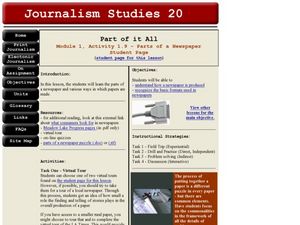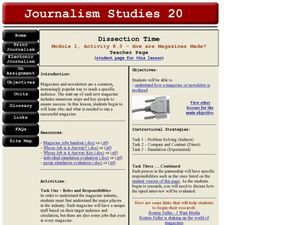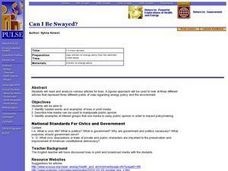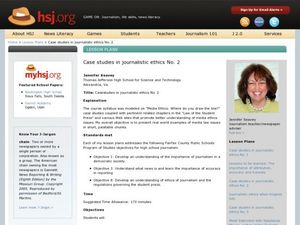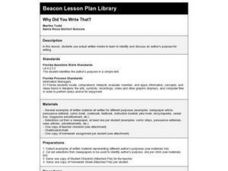Curated OER
Re-Searching
Students take a closer look at the research cycle. In this journalism activity, students discover and practice Internet searching skills. Students use the search techniques discussed to locate information on selected topics.
Curated OER
Part of it All
Students take a closer look at the organization of newspapers. In this journalism lesson, students take virtual tours of newspapers and complete a newspaper puzzle handout. Students then compare the layout of weekly rural newspapers to...
Curated OER
Dissection Time
Young scholars take a closer look at the organization of magazines. In this journalism lesson, students complete handouts about the jobs and responsibilities in the magazine industry. Young scholars then learn about the steps of...
Curated OER
Asking the Right Questions
Students explore interviewing skills. In this journalism instructional activity, students examine "good" and "bad" interview questions and discuss both. Students then practice interviewing partners in the classroom.
Curated OER
Writing a Newspaper Article
The perfect resource for a beginning journalism teacher or someone designing a journalism unit, this activity prompts students to write a newspaper article. It covers all aspects of the writing process, such as a guided warm-up...
Curated OER
Contraceptives and conscience
Students read The New Republic article and/or watch the News Ohio streaming video package. They employ a wide range of strategies as they write and use different writing process elements appropriately to communicate with different...
iCivics
Lesson 2: Misinformation
Fake news is a hot topic right now ... but what is it? Intrepid young investigators track down the facts that separate journalistic mistakes and misinformation through reading, research, and discussion. Part three in a five-lesson series...
Stanford University
Hurricane Katrina
The adage says that journalism is the first draft of history. How should people evaluate these sources of information? Taking into account various sources, including those from various perspectives and different creators, learners...
Media Smarts
Selling Tobacco
Take a look at tobacco advertising techniques through the decades. Students analyze the differences in strategies, and write an essay on the advertising history of one brand of tobacco, how tobacco advertising has changed over time, or...
Media Smarts
Violence on Television
Focus on a specific incident of violence on television in the case of the Canadian Broadcast System showing Silence of the Lambs on public television. Look at the broadcasting codes and a complaint that was filed against the Association....
Curated OER
Americas Idols
Young scholars engage in a lesson that is concerned with the concept of American Idol and the controversy that surrounds the broadcast. They conduct research using a variety of resources and write paragraphs that state opinions about the...
Curated OER
This Just in! Nile Network News Update
Have your young reporters research contributions of the ancient Egyptians, draft scripts, and broadcast their stories live on the Nile Network News. Depending on class size and age, topics may be brainstormed or assigned. The detailed...
Media Education Lab
Sponsored Content as Propaganda
What is sponsored content? Who produces sponsored content? Why? Is it fair or unfair? What are the privacy implications for consumers? To answer these questions, class members view a model screencast before crafting their own that...
Social Media Toolbox
Cyberbullying
What can we do to make our school community more aware of cyberbullying? From The Social Media Toolbox, instructional activity 10 of 16 takes on the tough topic of bullying. Learners research cyberbullying through online research, then...
Media Smarts
Looking at Newspapers: Introduction
A scavenger hunt introduces class groups to the different sections of newspapers and the different types of articles found in each section.
Curated OER
The War of the Worlds
Students discover the concept of media based on literature. In this War of the Worlds lesson, students read the novel The War of the Worlds by H.G. Wells and listen to the 1938 radio broadcast adaptation by Orson Welles. Students then...
Curated OER
Can I Be Swayed?
Students identify loaded words and examples of bias in print media. They describe how media can be used to manipulate public opinion. Students identify examples of interest groups that use media to sway public opinion in order to impact...
Curated OER
World War II Multimedia Newscast: History, Technology, Journalism
Pupils compose a multi-media newscast on various subjects relating to WWII to demonstrate their knowledge and ability to research.
Curated OER
The Whole World is Watching: Iran, 2009
Students study the impact of social media. In this Iranian election lesson plan, students examine the outcome of the 2009 election and the public protests that followed it. Students determine how citizen journalism informed people around...
Curated OER
A Pixie Biography Report
Students practice biographical writing after completing research on the subject. In this journalism lesson plan, students read a story of an important person's life and discuss the important moments along the way. Students utilize...
Curated OER
Facing War
Students visit two sites about World War II. These sites show how war can impact a nation and how people have coped with life during years of war. Particular attention is paid to how the media covers the current war in Iraq.
Curated OER
Case Studies in Journalistic Ethics No. 2
Learners use texts on media ethics and various Web sites to explore real world examples of media law issues. For this media ethics lesson, learners examine the Food Lion case using a transcript from the court of appeals session and...
Curated OER
Lessons to be Learned: The Importance of Attribution, Accuracy, and Honesty
Students investigate real world examples of media law issues. For this media law instructional activity, students read Janet Cooke’s feature and respond to the writing. Students read articles by Stephen Glass to highlight facts in need...
Curated OER
Why Did You Write That?
Second graders use actual written media to identify and discuss an author's purpose for writing. They identify the author's purpose in a selection from the newspaper, and write a short description of how they came to their conclusion.
Other popular searches
- Broadcast News
- Broadcast Media
- Journalism Hard News
- Elements of Broadcast News
- Broadcast Media Studies
- Advertising Broadcast Media
- Media Journalism
- Journalism News Ethics



